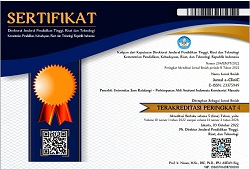GAMBARAN TINGKAT PENGETAHUAN TENTANG HIPERTENSI SEBAGAI FAKTOR RESIKO STROKE DAN KEPATUHAN MENGKONSUMSI OBAT ANTI HIPERTENSI PADA PENDERITA HIPERTENSI DI RSUP PROF. DR.R.D. KANDOU MANADO
DOI:
https://doi.org/10.35790/ecl.v1i2.3301Abstract
Latar belakang: Stroke adalah suatu penyakit defisit neurologis akut yang disebabkan oleh gangguan pembuluh darah otak yang terjadi secara mendadak dan menimbulkan gejala dan tanda yang sesuai dengan daerah otak yang terganggu. Hipertensi yang tidak diobati adalah penyebab utama stroke.Banyak penderita hipertensi yang tidak sadar dengan karakter penyakit sehingga masyarakat sering mengacuhkan terapi kontrol obat pada hipertensi. Penelitian ini bertujuan untuk mengetahui pengetahuan tentang hipertensi sebagai faktor resiko stroke dan kepatuhan dalam pengobatan pasien hipertensi. Metode: Penelitian ini merupakan penelitian yang bersifat deskriptif yang dilaksanakan dengan metode survei, dimana pengumpulan/pengambilan data diambil pada pasien rawat jalan hipertensi di bagian poliklinik ginjal dan hipertensi interna di RSUP Prof.DR.R.D Kandou Manado. Hasil: Jumlah sampel yang memenuhi kriteria untuk penelitian berjumlah 73 sampel di Bagian poli Interna RSU Prof. R. D. Kandou Manado bulan November 2012, umur dari responden yang terbanyak yaitu 46-65 tahun sebanyak 65 responden (89%) dan pendidikan terakhir dari responden yang terbanyak adalah pendidikan SLTA sebanyak 30 responden (41.1%), kebanyakan responden masih bekerja sebanyak 48 responden (65.8%).Kesimpulan: Berdasarkan dari hasil yang didapatkan, kategori tingkat pengetahuan responden tentang hipertensi sebagai faktor resiko stroke kebanyakan Cukup yaitu 34 responden (46.6%) kategori untuk kepatuhan mengkonsumsi obat anti hipertensi kebanyakan Baik yaitu sebanyak 39 responden (53.4%).
Kata kunci : Stroke, Hipertensi,Pengetahuan,Kepatuhan.
Â
ABSTRACT: Background: Stroke is a disease of acute neurological deficits caused by brain blood vessel disorders that occur suddenly and cause symptoms and signs corresponding to the affected brain regions. Untreated hypertension is a major cause of stroke. Many patients with hypertension are not aware of the character of the disease so that people often ignore drug therapy in hypertension control. This study aimed to determine the knowledge of hypertension as a risk factor for stroke and compliance in the treatment of hypertensive patients. Methods: This research is a descriptive study conducted by survey, where collection / retrieval of data taken at the outpatient clinic of hypertension on the kidney and hypertension in the department of internal Prof.DR.RD Kandou Manado. Results: The number of samples that meet the criteria for the study amounted to 73 samples in Part poly Interna RSU Prof. R. D. Kandou Manado in November 2012, the age of most respondents is 46-65 years by 65 respondents (89%) and education level of most respondents are high school education by 30 respondents (41.1%), most respondents still working as many as 48 respondents (65.8 %). Conclusion: Based on the results obtained, the respondents knowledge level category of hypertension as a risk factor for stroke mostly just the 34 respondents (46.6%) categories for compliance with anti-hypertensive drugs are mostly good total of 39 respondents (53.4%)
Keywords: Stroke, Hypertension, Knowledge, Compliance
Downloads
How to Cite
Issue
Section
License
COPYRIGHT
Authors who publish with this journal agree to the following terms:
Authors hold their copyright and grant this journal the privilege of first publication, with the work simultaneously licensed under a Creative Commons Attribution License that permits others to impart the work with an acknowledgment of the work's origin and initial publication by this journal.
Authors can enter into separate or additional contractual arrangements for the non-exclusive distribution of the journal's published version of the work (for example, post it to an institutional repository or publish it in a book), with an acknowledgment of its underlying publication in this journal.
Authors are permitted and encouraged to post their work online (for example, in institutional repositories or on their website) as it can lead to productive exchanges, as well as earlier and greater citation of the published work (See The Effect of Open Access).







